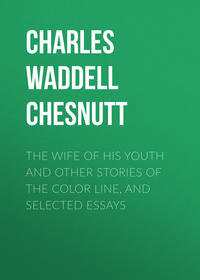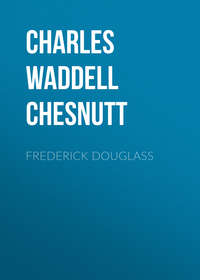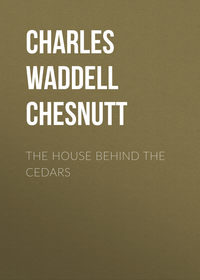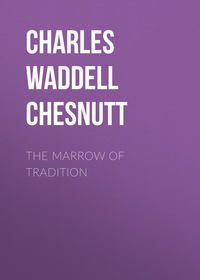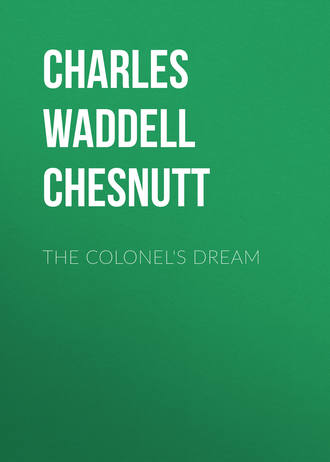 полная версия
полная версияThe Colonel's Dream
"Bud Johnson," said the justice, "you are charged with escaping from the service into which you were sold to pay the fine and costs on a charge of vagrancy. What do you plead—guilty or not guilty?"
The prisoner maintained a sullen silence.
"I'll enter a plea of not guilty. The record of this court shows that you were convicted of vagrancy on December 26th, and sold to Mr. Fetters for four months to pay your fine and costs. The four months won't be up for a week. Mr. Turner may be sworn."
Turner swore to Bud's escape and his pursuit. Haines testified to his capture.
"Have you anything to say?" asked the justice.
"What's de use er my sayin' anything," muttered the Negro. "It won't make no diff'ence. I didn' do nothin', in de fus' place, ter be fine' fer, an' run away 'cause dey did n' have no right ter keep me dere."
"Guilty. Twenty-five dollars an' costs. You are also charged with resisting the officer who made the arrest. Guilty or not guilty? Since you don't speak, I'll enter a plea of not guilty. Mr. Haines may be sworn."
Haines swore that the prisoner had resisted arrest, and had only been captured by the display of a loaded revolver. The prisoner was convicted and fined twenty-five dollars and costs for this second offense.
The third charge, for disorderly conduct in prison, was quickly disposed of, and a fine of twenty-five dollars and costs levied.
"You may consider yo'self lucky," said the magistrate, "that Mr. Haines didn't prefer a mo' serious charge against you. Many a nigger has gone to the gallows for less. And now, gentlemen, I want to clean this case up right here. How much time is offered for the fine and costs of the prisoner, Bud Johnson, amounting to seventy-five dollars fine and thirty-three dollars and fifty-fo' cents costs? You've heard the evidence an' you see the nigger. Ef there ain't much competition for his services and the time is a long one, he'll have his own stubbornness an' deviltry to thank for it. He's strong and healthy and able to do good work for any one that can manage him."
There was no immediate response. Turner walked forward and viewed the prisoner from head to foot with a coldly sneering look.
"Well, Bud," he said, "I reckon we'll hafter try it ag'in. I have never yet allowed a nigger to git the better o' me, an', moreover, I never will. I'll bid eighteen months, Squire; an' that's all he's worth, with his keep."
There was no competition, and the prisoner was knocked down to Turner, for Fetters, for eighteen months.
"Lock 'im up till I'm ready to go, Bill," said Turner to the constable, "an' just leave the irons on him. I'll fetch 'em back next time I come to town."
The unconscious brutality of the proceeding grated harshly upon the colonel's nerves. Delinquents of some kind these men must be, who were thus dealt with; but he had lived away from the South so long that so sudden an introduction to some of its customs came with something of a shock. He had remembered the pleasant things, and these but vaguely, since his thoughts and his interests had been elsewhere; and in the sifting process of a healthy memory he had forgotten the disagreeable things altogether. He had found the pleasant things still in existence, faded but still fragrant. Fresh from a land of labour unions, and of struggle for wealth and power, of strivings first for equality with those above, and, this attained, for a point of vantage to look down upon former equals, he had found in old Peter, only the day before, a touching loyalty to a family from which he could no longer expect anything in return. Fresh from a land of women's clubs and women's claims, he had reveled last night in the charming domestic, life of the old South, so perfectly preserved in a quiet household. Things Southern, as he had already reflected, lived long and died hard, and these things which he saw now in the clear light of day, were also of the South, and singularly suggestive of other things Southern which he had supposed outlawed and discarded long ago.
"Now, Mr. Haines, bring in the next lot," said the Squire.
The constable led out an old coloured man, clad in a quaint assortment of tattered garments, whom the colonel did not for a moment recognise, not having, from where he stood, a full view of the prisoner's face.
"Gentlemen, I now call yo'r attention to Lot Number Fo', left over from befo' the wah; not much for looks, but respectful and obedient, and accustomed, for some time past, to eat very little. Can be made useful in many ways—can feed the chickens, take care of the children, or would make a good skeercrow. What I am bid, gentlemen, for ol' Peter French? The amount due the co't is twenty-fo' dollahs and a half."
There was some laughter at the Squire's facetiousness. Turner, who had bid on the young and strong men, turned away unconcernedly.
"You'd 'a' made a good auctioneer, Squire," said the one-armed man.
"Thank you, Mr. Pearsall. How much am I offered for this bargain?"
"He'd be dear at any price," said one.
"It's a great risk," observed a second.
"Ten yeahs," said a third.
"You're takin' big chances, Mr. Bennet," said another. "He'll die in five, and you'll have to bury him."
"I withdraw the bid," said Mr. Bennet promptly.
"Two yeahs," said another.
The colonel was boiling over with indignation. His interest in the fate of the other prisoners had been merely abstract; in old Peter's case it assumed a personal aspect. He forced himself into the room and to the front.
"May I ask the meaning of this proceeding?" he demanded.
"Well, suh," replied the Justice, "I don't know who you are, or what right you have to interfere, but this is the sale of a vagrant nigger, with no visible means of suppo't. Perhaps, since you're interested, you'd like to bid on 'im. Are you from the No'th, likely?"
"Yes."
"I thought, suh, that you looked like a No'the'n man. That bein' so, doubtless you'd like somethin' on the Uncle Tom order. Old Peter's fine is twenty dollars, and the costs fo' dollars and a half. The prisoner's time is sold to whoever pays his fine and allows him the shortest time to work it out. When his time's up, he goes free."
"And what has old Peter done to deserve a fine of twenty dollars—more money than he perhaps has ever had at any one time?"
"'Deed, it is, Mars Henry, 'deed it is!" exclaimed Peter, fervently.
"Peter has not been able," replied the magistrate, "to show this co't that he has reg'lar employment, or means of suppo't, and he was therefore tried and convicted yesterday evenin' of vagrancy, under our State law. The fine is intended to discourage laziness and to promote industry. Do you want to bid, suh? I'm offered two yeahs, gentlemen, for old Peter French? Does anybody wish to make it less?"
"I'll pay the fine," said the colonel, "let him go."
"I beg yo' pahdon, suh, but that wouldn't fulfil the requi'ments of the law. He'd be subject to arrest again immediately. Somebody must take the responsibility for his keep."
"I'll look after him," said the colonel shortly.
"In order to keep the docket straight," said the justice, "I should want to note yo' bid. How long shall I say?"
"Say what you like," said the colonel, drawing out his pocketbook.
"You don't care to bid, Mr. Turner?" asked the justice.
"Not by a damn sight," replied Turner, with native elegance. "I buy niggers to work, not to bury."
"I withdraw my bid in favour of the gentleman," said the two-year bidder.
"Thank you," said the colonel.
"Remember, suh," said the justice to the colonel, "that you are responsible for his keep as well as entitled to his labour, for the period of your bid. How long shall I make it?"
"As long as you please," said the colonel impatiently.
"Sold," said the justice, bringing down his gavel, "for life, to—what name, suh?"
"French—Henry French."
There was some manifestation of interest in the crowd; and the colonel was stared at with undisguised curiosity as he paid the fine and costs, which included two dollars for two meals in the guardhouse, and walked away with his purchase—a purchase which his father had made, upon terms not very different, fifty years before.
"One of the old Frenches," I reckon, said a bystander, "come back on a visit."
"Yes," said another, "old 'ristocrats roun' here. Well, they ought to take keer of their old niggers. They got all the good out of 'em when they were young. But they're not runnin' things now."
An hour later the colonel, driving leisurely about the outskirts of the town and seeking to connect his memories more closely with the scenes around him, met a buggy in which sat the man Turner. After the buggy, tied behind one another to a rope, like a coffle of slaves, marched the three Negroes whose time he had bought at the constable's sale. Among them, of course, was the young man who had been called Bud Johnson. The colonel observed that this Negro's face, when turned toward the white man in front of him, expressed a fierce hatred, as of some wild thing of the woods, which finding itself trapped and betrayed, would go to any length to injure its captor.
Turner passed the colonel with no sign of recognition or greeting.
Bud Johnson evidently recognised the friendly gentleman who had interfered in Peter's case. He threw toward the colonel a look which resembled an appeal; but it was involuntary, and lasted but a moment, and, when the prisoner became conscious of it, and realised its uselessness, it faded into the former expression.
What the man's story was, the colonel did not know, nor what were his deserts. But the events of the day had furnished food for reflection. Evidently Clarendon needed new light and leading. Men, even black men, with something to live for, and with work at living wages, would scarcely prefer an enforced servitude in ropes and chains. And the punishment had scarcely seemed to fit the crime. He had observed no great zeal for work among the white people since he came to town; such work as he had seen done was mostly performed by Negroes. If idleness were a crime, the Negroes surely had no monopoly of it.
Nine
Furnished with money for his keep, Peter was ordered if again molested to say that he was in the colonel's service. The latter, since his own plans were for the present uncertain, had no very clear idea of what disposition he would ultimately make of the old man, but he meant to provide in some way for his declining years. He also bought Peter a neat suit of clothes at a clothing store, and directed him to present himself at the hotel on the following morning. The interval would give the colonel time to find something for Peter to do, so that he would be able to pay him a wage. To his contract with the county he attached little importance; he had already intended, since their meeting in the cemetery, to provide for Peter in some way, and the legal responsibility was no additional burden. To Peter himself, to whose homeless old age food was more than philosophy, the arrangement seemed entirely satisfactory.
Colonel French's presence in Clarendon had speedily become known to the public. Upon his return to the hotel, after leaving Peter to his own devices for the day, he found several cards in his letter box, left by gentlemen who had called, during his absence, to see him.
The daily mail had also come in, and the colonel sat down in the office to read it. There was a club notice, and several letters that had been readdressed and forwarded, and a long one from Kirby in reference to some detail of the recent transfer. Before he had finished reading these, a gentleman came up and introduced himself. He proved to be one John McLean, an old schoolmate of the colonel, and later a comrade-in-arms, though the colonel would never have recognised a rather natty major in his own regiment in this shabby middle-aged man, whose shoes were run down at the heel, whose linen was doubtful, and spotted with tobacco juice. The major talked about the weather, which was cool for the season; about the Civil War, about politics, and about the Negroes, who were very trifling, the major said. While they were talking upon this latter theme, there was some commotion in the street, in front of the hotel, and looking up they saw that a horse, attached to a loaded wagon, had fallen in the roadway, and having become entangled in the harness, was kicking furiously. Five or six Negroes were trying to quiet the animal, and release him from the shafts, while a dozen white men looked on and made suggestions.
"An illustration," said the major, pointing through the window toward the scene without, "of what we've got to contend with. Six niggers can't get one horse up without twice as many white men to tell them how. That's why the South is behind the No'th. The niggers, in one way or another, take up most of our time and energy. You folks up there have half your work done before we get our'n started."
The horse, pulled this way and that, in obedience to the conflicting advice of the bystanders, only became more and more intricately entangled. He had caught one foot in a manner that threatened, with each frantic jerk, to result in a broken leg, when the colonel, leaving his visitor without ceremony, ran out into the street, leaned down, and with a few well-directed movements, released the threatened limb.
"Now, boys," he said, laying hold of the prostrate animal, "give a hand here."
The Negroes, and, after some slight hesitation, one or two white men, came to the colonel's aid, and in a moment, the horse, trembling and blowing, was raised to its feet. The driver thanked the colonel and the others who had befriended him, and proceeded with his load.
When the flurry of excitement was over, the colonel went back to the hotel and resumed the conversation with his friend. If the new franchise amendment went through, said the major, the Negro would be eliminated from politics, and the people of the South, relieved of the fear of "nigger domination," could give their attention to better things, and their section would move forward along the path of progress by leaps and bounds. Of himself the major said little except that he had been an alternate delegate to the last Democratic National Nominating Convention, and that he expected to run for coroner at the next county election.
"If I can secure the suppo't of Mr. Fetters in the primaries," he said, "my nomination is assured, and a nomination is of co'se equivalent to an election. But I see there are some other gentlemen that would like to talk to you, and I won't take any mo' of yo' time at present."
"Mr. Blake," he said, addressing a gentleman with short side-whiskers who was approaching them, "have you had the pleasure of meeting Colonel French?"
"No, suh," said the stranger, "I shall be glad to have the honour of an introduction at your hands."
"Colonel French, Mr. Blake—Mr. Blake, Colonel French. You gentlemen will probably like to talk to one another, because you both belong to the same party, I reckon. Mr. Blake is a new man roun' heah—come down from the mountains not mo' than ten yeahs ago, an' fetched his politics with him; but since he was born that way we don't entertain any malice against him. Mo'over, he's not a 'Black and Tan Republican,' but a 'Lily White.'"
"Yes, sir," said Mr. Blake, taking the colonel's hand, "I believe in white supremacy, and the elimination of the nigger vote. If the National Republican Party would only ignore the coloured politicians, and give all the offices to white men, we'll soon build up a strong white Republican party. If I had the post-office here at Clarendon, with the encouragement it would give, and the aid of my clerks and subo'dinates, I could double the white Republican vote in this county in six months."
The major had left them together, and the Lily White, ere he in turn made way for another caller, suggested delicately, that he would appreciate any good word that the colonel might be able to say for him in influential quarters—either personally or through friends who might have the ear of the executive or those close to him—in reference to the postmastership. Realising that the present administration was a business one, in which sentiment played small part, he had secured the endorsement of the leading business men of the county, even that of Mr. Fetters himself. Mr. Fetters was of course a Democrat, but preferred, since the office must go to a Republican, that it should go to a Lily White.
"I hope to see mo' of you, sir," he said, "and I take pleasure in introducing the Honourable Henry Clay Appleton, editor of our local newspaper, the Anglo-Saxon. He and I may not agree on free silver and the tariff, but we are entirely in harmony on the subject indicated by the title of his newspaper. Mr. Appleton not only furnishes all the news that's fit to read, but he represents this county in the Legislature, along with Mr. Fetters, and he will no doubt be the next candidate for Congress from this district. He can tell you all that's worth knowin' about Clarendon."
The colonel shook hands with the editor, who had come with a twofold intent—to make the visitor's acquaintance and to interview him upon his impressions of the South. Incidentally he gave the colonel a great deal of information about local conditions. These were not, he admitted, ideal. The town was backward. It needed capital to develop its resources, and it needed to be rid of the fear of Negro domination. The suffrage in the hands of the Negroes had proved a ghastly and expensive joke for all concerned, and the public welfare absolutely demanded that it be taken away. Even the white Republicans were coming around to the same point of view. The new franchise amendment to the State constitution was receiving their unqualified support.
"That was a fine, chivalrous deed of yours this morning, sir," he said, "at Squire Reddick's office. It was just what might have been expected from a Southern gentleman; for we claim you, colonel, in spite of your long absence."
"Yes," returned the colonel, "I don't know what I rescued old Peter from. It looked pretty dark for him there for a little while. I shouldn't have envied his fate had he been bought in by the tall fellow who represented your colleague in the Legislature. The law seems harsh."
"Well," admitted the editor, "I suppose it might seem harsh, in comparison with your milder penal systems up North. But you must consider the circumstances, and make allowances for us. We have so many idle, ignorant Negroes that something must be done to make them work, or else they'll steal, and to keep them in their place, or they would run over us. The law has been in operation only a year or two, and is already having its effect. I'll be glad to introduce a bill for its repeal, as soon as it is no longer needed.
"You must bear in mind, too, colonel, that niggers don't look at imprisonment and enforced labour in the same way white people do—they are not conscious of any disgrace attending stripes or the ball and chain. The State is poor; our white children are suffering for lack of education, and yet we have to spend a large amount of money on the Negro schools. These convict labour contracts are a source of considerable revenue to the State; they make up, in fact, for most of the outlay for Negro education—which I approve of, though I'm frank to say that so far I don't see much good that's come from it. This convict labour is humanely treated; Mr. Fetters has the contract for several counties, and anybody who knows Mr. Fetters knows that there's no kinder-hearted man in the South."
The colonel disclaimed any intention of criticising. He had come back to his old home for a brief visit, to rest and to observe. He was willing to learn and anxious to please. The editor took copious notes of the interview, and upon his departure shook hands with the colonel cordially.
The colonel had tactfully let his visitors talk, while he listened, or dropped a word here and there to draw them out. One fact was driven home to him by every one to whom he had spoken. Fetters dominated the county and the town, and apparently the State. His name was on every lip. His influence was indispensable to every political aspirant. His acquaintance was something to boast of, and his good will held a promise of success. And the colonel had once kicked the Honourable Mr. Fetters, then plain Bill, in presence of an admiring audience, all the way down Main Street from the academy to the bank! Bill had been, to all intents and purposes, a poor white boy; who could not have named with certainty his own grandfather. The Honourable William was undoubtedly a man of great ability. Had the colonel remained in his native State, would he have been able, he wondered, to impress himself so deeply upon the community? Would blood have been of any advantage, under the changed conditions, or would it have been a drawback to one who sought political advancement?
When the colonel was left alone, he went to look for Phil, who was playing with the children of the landlord, in the hotel parlour. Commending him to the care of the Negro maid in charge of them, he left the hotel and called on several gentlemen whose cards he had found in his box at the clerk's desk. Their stores and offices were within a short radius of the hotel. They were all glad to see him, and if there was any initial stiffness or shyness in the attitude of any one, it soon became the warmest cordiality under the influence of the colonel's simple and unostentatious bearing. If he compared the cut of their clothes or their beards to his own, to their disadvantage, or if he found their views narrow and provincial, he gave no sign—their hearts were warm and their welcome hearty.
The colonel was not able to gather, from the conversation of his friends, that Clarendon, or any one in the town—always excepting Fetters, who did not live in the town, but merely overshadowed it—was especially prosperous. There were no mills or mines in the neighbourhood, except a few grist mills, and a sawmill. The bulk of the business consisted in supplying the needs of an agricultural population, and trading in their products. The cotton was baled and shipped to the North, and re-imported for domestic use, in the shape of sheeting and other stuffs. The corn was shipped to the North, and came back in the shape of corn meal and salt pork, the staple articles of diet. Beefsteak and butter were brought from the North, at twenty-five and fifty cents a pound respectively. There were cotton merchants, and corn and feed merchants; there were dry-goods and grocery stores, drug stores and saloons—and more saloons—and the usual proportion of professional men. Since Clarendon was the county seat, there were of course a court house and a jail. There were churches enough, if all filled at once, to hold the entire population of the town, and preachers in proportion. The merchants, of whom a number were Jewish, periodically went into bankruptcy; the majority of their customers did likewise, and thus a fellow-feeling was promoted, and the loss thrown back as far as possible. The lands of the large farmers were mostly mortgaged, either to Fetters, or to the bank of which he was the chief stockholder, for all that could be borrowed on them; while the small farmers, many of whom were coloured, were practically tied to the soil by ropes of debt and chains of contract.
Every one the colonel met during the afternoon had heard of Squire Reddick's good joke of the morning. That he should have sold Peter to the colonel for life was regarded as extremely clever. Some of them knew old Peter, and none of them had ever known any harm of him, and they were unanimous in their recognition and applause of the colonel's goodheartedness. Moreover, it was an index of the colonel's views. He was one of them, by descent and early associations, but he had been away a long time, and they hadn't really known how much of a Yankee he might have become. By his whimsical and kindly purchase of old Peter's time—or of old Peter, as they smilingly put it, he had shown his appreciation of the helplessness of the Negroes, and of their proper relations to the whites.
"What'll you do with him, Colonel?" asked one gentleman. "An ole nigger like Peter couldn't live in the col' No'th. You'll have to buy a place down here to keep 'im. They wouldn' let you own a nigger at the No'th."
The remark, with the genial laugh accompanying it, was sounding in the colonel's ears, as, on the way back to the hotel, he stepped into the barber shop. The barber, who had also heard the story, was bursting with a desire to unbosom himself upon the subject. Knowing from experience that white gentlemen, in their intercourse with coloured people, were apt to be, in the local phrase; "sometimey," or uncertain in their moods, he first tested, with a few remarks about the weather, the colonel's amiability, and finding him approachable, proved quite talkative and confidential.



